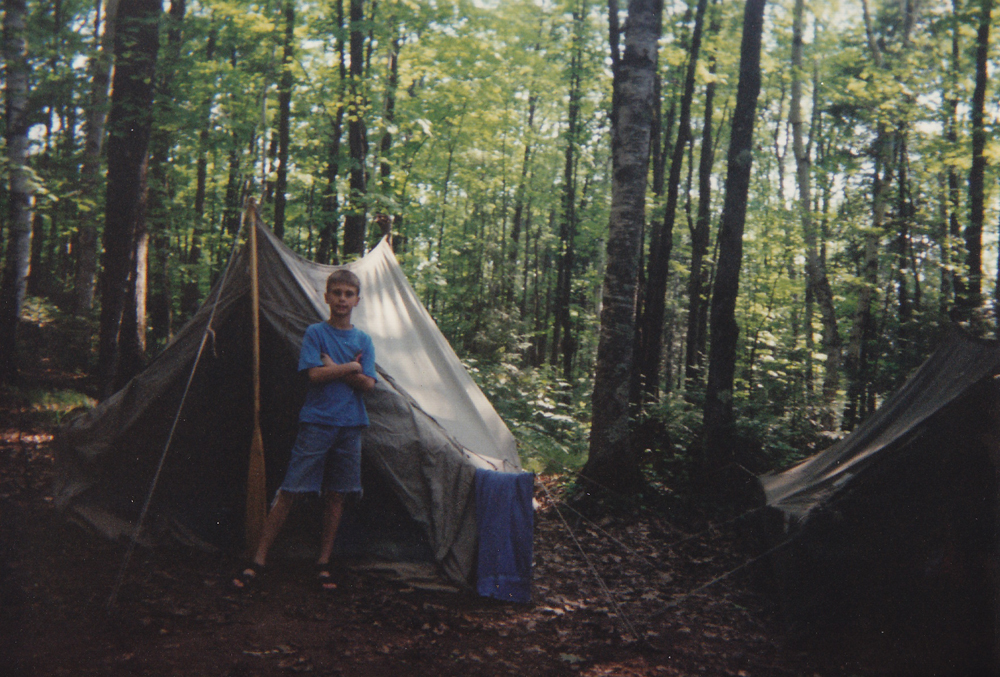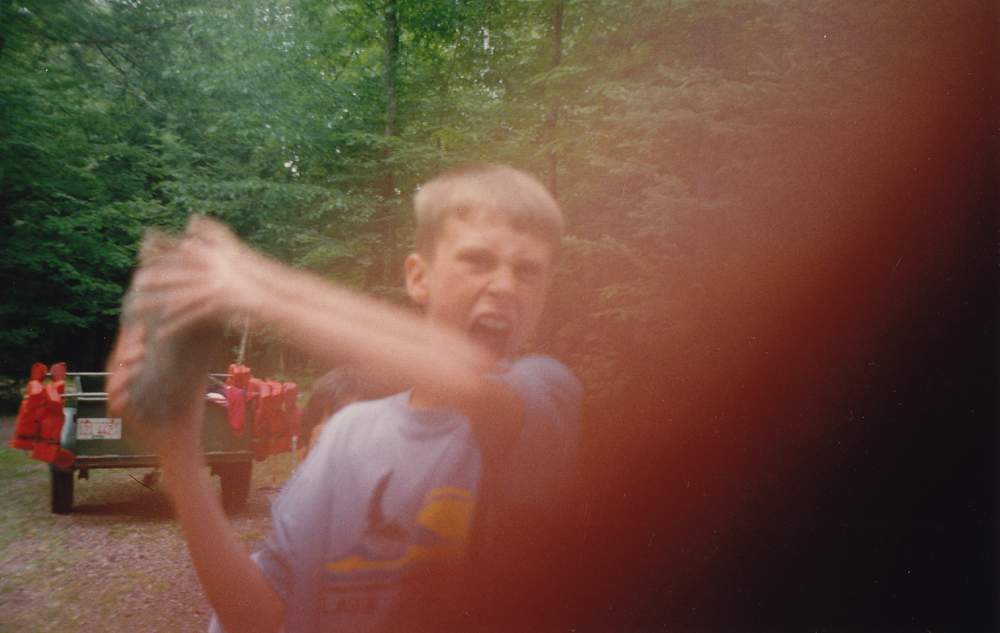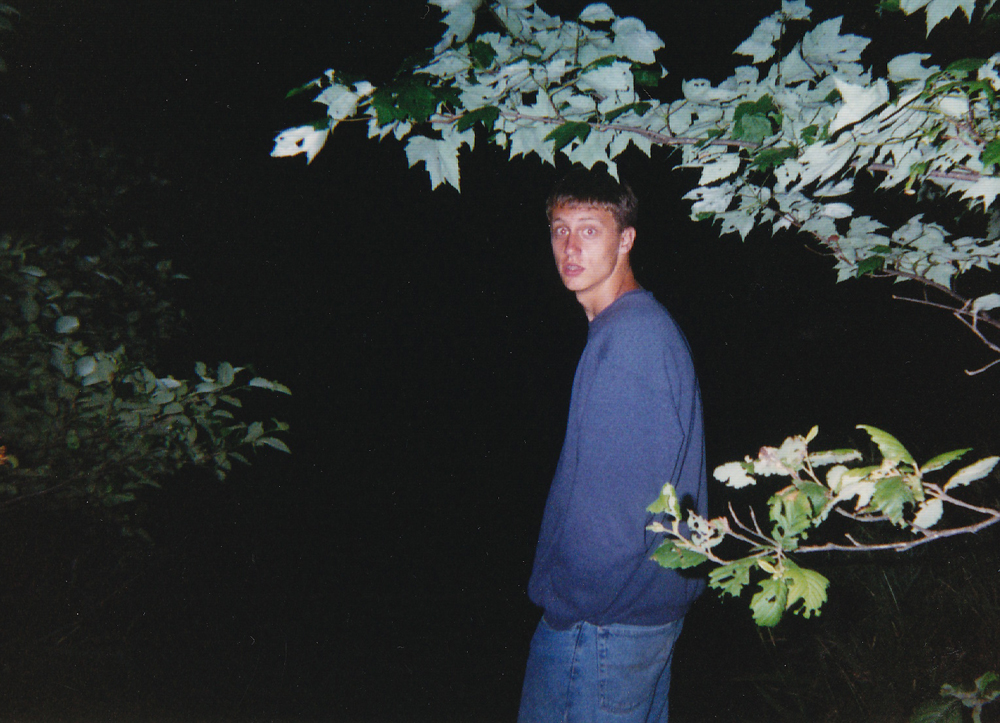Where there’s a Will there’s a way: An interview with David Will: Part 1
Around the same time I began interviewing my brother Dan, I sent along some questions to our buddy—the real, live grandson of William T. Will himself—David Will. Having spent time up at Shewahmegon for many—if not every—summer of his life, David has many more years of sharing camp stories under his belt than most can boast. Plus, he has a fairly unique view of camp as a member of the Shewahmegon-founding Will family. So, obviously, it was a pleasure to pick his brain on all things Shewahmegon!
David was in Dan’s cabin—a year younger than mine—for the entirety of D. Gibb’s run at camp, and we were all Junior Counselors together during the final year of camp in 2001.
As was the case before, I’ve edited for grammar and added some brief explanatory bits.
Now, without further ado, here’s the first installment of my interview with David Will!
Being a member of the Will family, you—essentially and possibly literally—started attending camp as soon as you popped out of the womb. Let’s skip the pre-camper years. What were your first summers as a camper like? What sticks out i your memory from those early years?
DAVID WILL: My first few summers as a camper were a transition period for me, where being a Will family member came second to my role as a camper. As a “day camper,” the structure of my day was significantly different from that of a normal camper, where I had different freedoms and constraints. My schedule was also more subject to my whims (as a day camper). I would attend instructional swim or lodge when I felt like it. If I didn’t want to go to activities that day, I could play in the trailer with my toys or watch television. I interacted with campers at that time, and though the older cabins would play around with me, it was more difficult to interact with the younger campers. Since I wasn’t one of their cabin mates, the time I spent bonding was limited.
So, when I became a camper, there was a sharp learning curve that I had to quickly adjust to. I quickly realized that my preferences came secondary to the schedule and to the cabin. If it was instructional swim, I had to swim. If it was time for rest, I needed to lay on my bunk. I had to attend activities, I had to stay with the cabin. The primary boss was the counselor, not my mom or dad. This shift, which was initially difficult to adjust to, became very liberating and rewarding. By having to go to activities or swim, I learned to make choices and learned to grow under the constraints. I learned to swim, to play team games, to canoe, to camp, to work hard. None of these skills would have been accessible (to me) as a day camper. The constraint of camp’s structure also allowed me to develop life long friendships. I was no longer peripheral, rather (I was) a deeply involved member of the cabin unit. I learned to play and work, eat and sleep, win and lose as a group.
In terms of specific memories that stick out from these years, the ones I remember most are the random and silly moments with the cabin: telling scary stories of “Green Feather” on Red Rock and hardly being able to sleep at night, playing countless hours of the finger game (“enter the store”) at the dining hall table, paddling our hardest and still falling behind in the camper canoe, playing complicated versions of tag on the cabin porch, listening to the music the counselor would have on his CD player, etc.

David Will in 1995 at the now infamous Cabin 10 Twin Lakes campout.
Tag on the porch? Damn… sounds like a game for solely intended for daredevils based on the height of some of those porches.
You mentioned the skills you learned at camp. I always think its crazy how often these weird facts about me come up in random conversation. “Oh yeah, I took Red Cross sailing for three years and instructed it for a while.” “Oddly enough, I was actually an accomplished target shooting archer.” I don’t use either of those skills anymore (Which is a shame), but I think camp taught me a lot of skills, be it the more official skills from boating courses or just how to make a campfire. As far as the education of camp goes, what do you remember? With your time at camp, I imagine you had a chance to take rowing on through power boating before you became a staffer.
DAVID WILL: Yeah, tag on the porch required some creative thinking and clever restrictions on the tagger, i.e. the tagger had to close his eyes and couldn’t move from one spot. But that was the fun of rest period. You had only so many objects and so much square footage of cabin space. You had to rely on creativity or sleeping to get through it.
It’s funny that you mention the subtle ways the learning done at camp gets incorporated into your life. I know that I am constantly reminded in odd cases of my formal and not so formal teachings in the northern woods. As you guessed it, I believe I have done every single instructional course at Shewahmegon from power boating and rowing to conditioning and basketball. I also had the privilege of helping with sailing (alongside the mighty Jim Gibbons) and taught rowing as well. The time in these courses was well spent, not only for the learning experience, but also the explicit pleasure of doing the activity. As you well know, there are few thrills in life like sailing in the Cub on windy day, trying to tip her over or practicing real man over board drills when a shipmate (Danny Aronson) slipped off the deck. SCUBA diving was another of my favorites. It was a very surreal experience—somewhat intimidating and always exciting. My dad (Tim Will)always put the fear of “air embolisms” into us on the first day. And even though we were not in any real danger, the perceived risk added to thrill. And of course, the canoeing course has been invaluable to me over the years, helping me tackle the Border Trip or helping me feel comfortable mucking about on Lake Owen in the evenings.
Like you mentioned with your example of building a fire, a lot of the learning done at camp was informal. Without being forced to learn, a lot of what I picked up became fun. Unfortunately, there is simply no way I could recall all the skills I have learned at camp. I believe that Shewahmegon is largely responsible for the person I am today, and as such, I couldn’t do justice attempting to list all the skills I developed there. However, some of the practical and unpractical skills have served me well over the years, and I can share a few quick stories.
There is an art to blowing on a fire. It requires timing, endurance and patience. I would like to think that I am master fireblower and as such am willing to loan my services to those in need. While in Bunkhouse, on a trip down the Brule River, we came across a gaggle of teenage girls who were camping adjacent to us. Being 14-year-old boys, we wanted their company, but were hard pressed to find a way to approach them. That’s when I noticed their fire was a bit low and offered to blow on it for them. Was it awkward? Sure. Did they think I was a dork? Absolutely! Did we spend the entire night hanging out with them in front of a roaring fire? You better believe it!
I think a more practical skill I learned at camp was being able to get along with different sorts of people in close proximity. I can’t say that I always got along with every guy in my cabin, but I like to believe that I learned to handle tough situations in a reasonable way. For instance, if your suitemate in college had been rat-tailing you the night before, a very mature approach is to pour freezing water on him while he showers. Or if your roommate is harassing you, you can always find something valuable of theirs to throw in the laundry (Sorry, Axel.). While I am kidding (although I did do these things), the truth is I really learned how to get along with folks.
I think it is funny that skills you learn surrounded only by boys can help you get a girlfriend. Surprisingly, some women find it very sexy (or hilarious) that I am an amateur turtle hunter. With over 30 feet of snapping turtles caught at Camp Shewahmegon, I am a master of leaping out of a canoe and grabbing turtles. I use these excellent truths as an ice breaker in new crowds with much success as most people are willing to chat with a turtle hunter. One such person who was interested in these stories became my girlfriend, and inevitably became my wife. She is now on her way to becoming an expert turtle hunter.

Once again, 1995 at Twin Lakes, I believe. Mere seconds before David first bludgeoned someone with a blunt object.
(Photos in this post are from the Dan Gibbons Collection.)
Similar Posts:
Tags: Brule River, Camp Shewahmegon, Canoeing, David Will, Fire, Rowing, Sailing, Turtle Hunt, Twin Lakes

Follow Me!